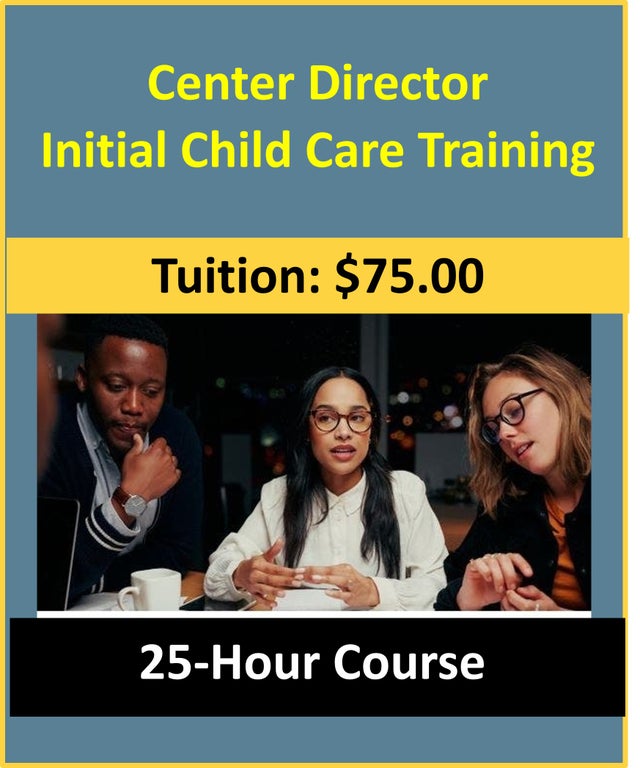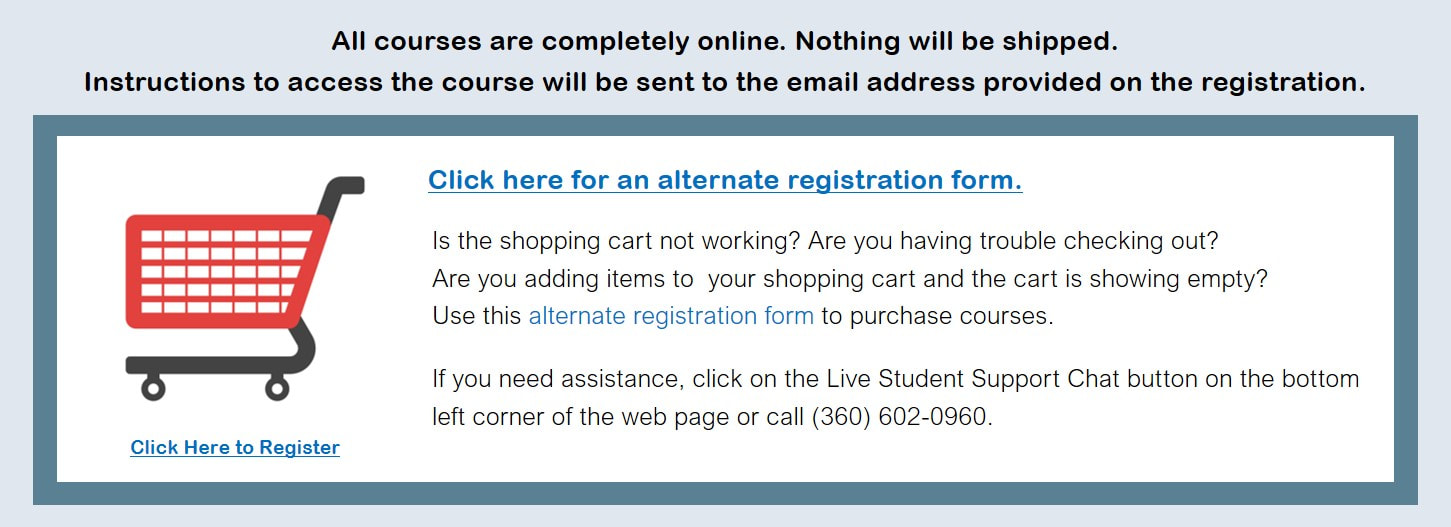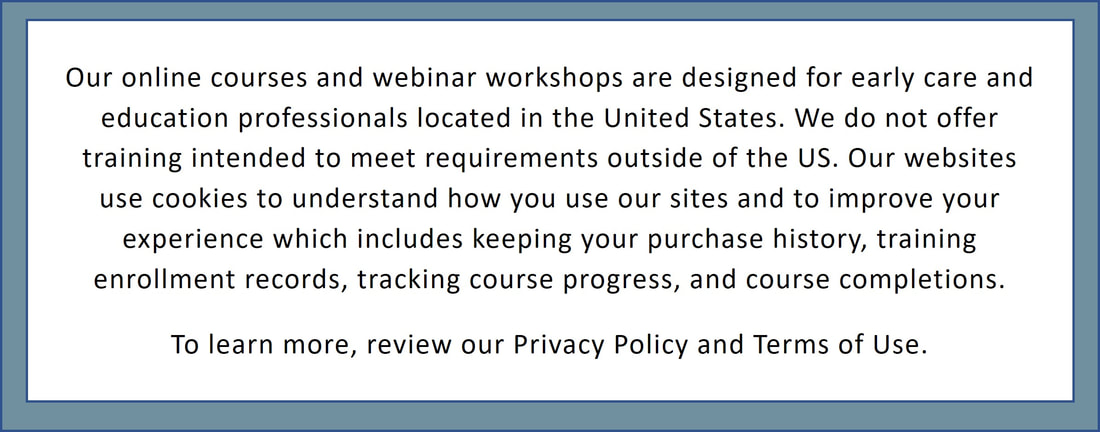- Alabama Child Care Courses
- >
- Center Director Initial Child Care Training - 25 Hours
Center Director Initial Child Care Training - 25 Hours
SKU:
$75.00
$75.00
Unavailable
per item
25 Hours Professional Development Online
Center Director Initial Child Care Training
25 Clock-Hours Professional Development
🌟 Self-Paced Online Courses 🌟 Open Enrollment 🌟Complete Any Time of Day or Night 🌟
🌟 Mobile Friendly 🌟 Meets Instructor-Led Requirements 🌟
🌟 Mobile Friendly 🌟 Meets Instructor-Led Requirements 🌟
- This course is presented in English.
This course satisfies the following training requirements:
- Child Care Administration and Management (20 hours)
- Quality Child Care (5 hours)
- "The center director shall have at least twenty (20) clock hours of training in administration and management and at least four (4) clock hours of training in quality child care."
Both the law and licensing requirements are subject to change. To ensure that you have accurate and complete information, check with the licensing office to see whether there have been any changes since the information in this course was last updated.
Course Agenda and Learning Outcomes
Module 1: Professional Practices
This module takes a broad look at the nationally recognized standards of professional practices for child care, found in the National Association for the Education of Young Children (NAEYC) Code of Ethics. Students will learn how early childhood program policies and procedures demonstrate the implementation of the state's expectations written in the Alabama Minimum Standards for Day Care Centers and Nighttime Centers Regulations and Procedures.
Module 1 Learning Outcomes:
Module 2: Promoting Diversity in Early Childhood
This module is designed to build a foundation of respect and presence for children and families; including culture, diversity and ability.
Module 2 Learning Outcomes:
Module 3: Principles of Child Development
This module will discuss the importance of understanding patterns of growth, change, and variables in behavior that occur during childhood. Knowledge of child growth and development provides a foundation for quality child care.
Module 3 Learning Outcomes:
Module 4: Assessing Child-Centered Care through Direct Observation
This module is designed to create an understanding of the importance of observation and assessment and how it shapes curriculum.
Module 4 Learning Outcomes:
Module 5: Planning and Administration of a Developmentally Appropriate Programs
This module is designed to teach participants how to plan developmentally appropriate activities or a group of children based on their ages and individual needs.
Module 5 Learning Outcomes:
Module 6: Family and Community Partnerships
This module is designed to explore ways which child care administrators can support parent and family engagement, strategies to create respectful partnerships and identify supportive community resources.
Module 6 Learning Outcomes:
Module 7: Managing a Safe Child Care Program
This module is designed provide administrative support facilitating practices that keep children healthy and safe in early learning programs.
Module 7 Learning Outcomes:
Module 8: Keeping Staff and Children Healthy
This module is designed to address the concepts of wellness, nutrition and fitness in early childhood and introduce the basic licensing requirements for healthy practices.
Module 8 Learning Outcomes:
Module 9: Engaging in Meaningful Interactions
This module is designed to help caregivers identify interactions that build secure relationships, understand the root of challenging behaviors, and set limits is that reach children and support the development of their self-regulations skills.
Module 9 Learning Outcomes:
Module 10: The Impacts of Childhood Trauma
The majority of children in early learning programs experience some adverse childhood experiences. It is important for the professionals who care for them to understand the impact of trauma on development and to cultivate strategies that build children's resilience so they are able to succeed. This module will also address compassion fatigue and emphasize the importance of caregiver self-care to reduce the impact of secondary trauma.
Module 10 Learning Outcomes:
This module takes a broad look at the nationally recognized standards of professional practices for child care, found in the National Association for the Education of Young Children (NAEYC) Code of Ethics. Students will learn how early childhood program policies and procedures demonstrate the implementation of the state's expectations written in the Alabama Minimum Standards for Day Care Centers and Nighttime Centers Regulations and Procedures.
Module 1 Learning Outcomes:
- The student will summarize the fundamentals of professional behavior and on-going growth.
- The student will relate program policies to specific Alabama licensing rules and laws.
- The student will identify what, where and how records are kept.
Module 2: Promoting Diversity in Early Childhood
This module is designed to build a foundation of respect and presence for children and families; including culture, diversity and ability.
Module 2 Learning Outcomes:
- The student will discuss the attributes of diversity of families.
- The student will describe strategies for interacting collaboratively with all children and adults.
- The student will evaluate technique's for communicating with families about their development.
Module 3: Principles of Child Development
This module will discuss the importance of understanding patterns of growth, change, and variables in behavior that occur during childhood. Knowledge of child growth and development provides a foundation for quality child care.
Module 3 Learning Outcomes:
- The student will recognize development as a continuum with identifiable basic milestones.
- The student will identify developmental needs of infants, toddlers and preschoolers, and school-agers to age eight.
- The student will describe early brain development.
Module 4: Assessing Child-Centered Care through Direct Observation
This module is designed to create an understanding of the importance of observation and assessment and how it shapes curriculum.
Module 4 Learning Outcomes:
- The student will give examples of children developing at their own rate.
- The student will identify techniques for collecting child development information.
- The student will describe professional behavior regarding confidentiality of referrals.
Module 5: Planning and Administration of a Developmentally Appropriate Programs
This module is designed to teach participants how to plan developmentally appropriate activities or a group of children based on their ages and individual needs.
Module 5 Learning Outcomes:
- The student will describe environments which nurture children and stimulate learning.
- The student will identify indoor and outdoor activities that invite participation of all children.
- The student will plan developmentally appropriate activities for children in a variety of settings.
Module 6: Family and Community Partnerships
This module is designed to explore ways which child care administrators can support parent and family engagement, strategies to create respectful partnerships and identify supportive community resources.
Module 6 Learning Outcomes:
- The student will recognize that families are the primary educators of their children.
- The students will explore the goal of parent and family engagement and strategies to create respectful partnerships.
- The students will develop strategies, as a director, to support family partnerships; including identifying community resources that support families.
Module 7: Managing a Safe Child Care Program
This module is designed provide administrative support facilitating practices that keep children healthy and safe in early learning programs.
Module 7 Learning Outcomes:
- The student can differentiate between compliance and non-compliance of health and safety regulations.
- The student can summarize their roll as a mandated reporter of child abuse and neglect.
- The student will identify a healthy physical environment for children, including procedures for health and safety.
Module 8: Keeping Staff and Children Healthy
This module is designed to address the concepts of wellness, nutrition and fitness in early childhood and introduce the basic licensing requirements for healthy practices.
Module 8 Learning Outcomes:
- The student will demonstrate healthy practices: sanitation, hand-washing, diapering, food-handling and meal/snack procedures.
- The student will describe basic daily nutrition, exercise, and sleep needs of children.
- The student will identify signs of and care for basic childhood illnesses and injuries.
Module 9: Engaging in Meaningful Interactions
This module is designed to help caregivers identify interactions that build secure relationships, understand the root of challenging behaviors, and set limits is that reach children and support the development of their self-regulations skills.
Module 9 Learning Outcomes:
- The student will identify techniques for building secure relationships, forming the basis for a child's ability to manage his/her own behavior.
- The student will identify positive response to children.
- The student will recognize challenging behavior and commit to limit setting that supports self-regulation.
Module 10: The Impacts of Childhood Trauma
The majority of children in early learning programs experience some adverse childhood experiences. It is important for the professionals who care for them to understand the impact of trauma on development and to cultivate strategies that build children's resilience so they are able to succeed. This module will also address compassion fatigue and emphasize the importance of caregiver self-care to reduce the impact of secondary trauma.
Module 10 Learning Outcomes:
- The student will be able to explain how adverse childhood experiences and toxic stress impact young children's development.
- The student will be able to describe how to build resilience in children.
- The student will be able to identify strategies for supporting children's ability to self-regulate.
Technical Requirements:
This training platform is user friendly, and it is expected that the majority of students will find that their computers and mobile devices operate without any complications. However, here are a few things to keep in mind:
Internet Explorer will not work to complete this course. Internet Explorer is no longer supported by Microsoft, and you WILL have issues if you use it to complete online training. Please use a different browser other than Internet Explorer.
We have provided optional links below where you can download alternate browsers. All browsers are free to download and use on your computer.
- A laptop or PC are recommended for completing online courses
- Most students are able to use mobile devices such as tablets and cell phones to complete courses.
- Recommended internet browsers: Google Chrome, Microsoft Edge, Safari, Mozilla Firefox and Opera are all acceptable browsers
- Some courses have assignments which may require downloading and editing a document using an application on your computer or mobile device. Applications that work to open the Word document are: Microsoft Word, Pages, Text Editor, Google Docs, and WordPad
- Make sure you’re using a current operating system (for example, Windows 10 or Apple OS)
- Outdated operating systems may cause technical difficulties
- Slow internet speed may impact loading time
Internet Explorer will not work to complete this course. Internet Explorer is no longer supported by Microsoft, and you WILL have issues if you use it to complete online training. Please use a different browser other than Internet Explorer.
We have provided optional links below where you can download alternate browsers. All browsers are free to download and use on your computer.
Terms of Use
Enrollment and Access to Training
- You have access to online courses for 1 year from the date of payment.
- For immediate access to courses at the time of payment, enroll at our sister site www.myececlass.com.
- When enrolling on our home page at www.cdastars.com, the information to access the online course will be sent to the email address provided during enrollment hours.
*Times shown are for the Central Time Zone. - New Enrollments Are Set-Up During the Following Times:
Monday - Friday 9 am – 10 pm
Saturday & Sunday 10 am – 10 pm
Holidays 11 am – 10 pm - Registrations that are submitted at www.cdastars.com after enrollment hours will be processed the next morning. You will receive an email with information to access the course.
- Check your email for instructions to start the training. Click on the link in the email to access the course.
Technical Requirements and Support
- Internet access is required to complete our courses.
- Some students may find that they have to update their internet browser, this is most often the case when trying to use Internet Explorer. We recommend Mozilla Firefox or Google Chrome for the best results. Our student support staff is happy to assist students with troubleshooting should you encounter technical issues, and will provide common suggestions for solving problems that occur when normal browser maintenance or application updates need to occur.
- Cancellations and refunds requested within 72 hours after enrollment are available for courses/programs that have NOT been accessed.
- Refunds are not available after 72 hours from the date of payment.
- Refunds are not available for courses/programs that have been accessed.
- Once the student has logged in to the course, a refund is no longer available.
- Refunds and cancellations WILL be charged a 20% cancellation fee.
- After 72 hours from the time of purchase, the payment credit can be transferred to a different training or to a new student if the training was not started by the original student for up to 30 days after enrollment.
- To try out a course before purchasing, click here for a *free course*
Course Curriculum and Certificates
- Course curriculum is developed by Successful Solutions Training in Child Development Instructors
- This course was designed to meet the 25 hours of initial training that is required for directors in Alabama.
- This course is presented in English.
- Free preview of any course is available by registering for the course and clicking on the "Take a Look! Enroll Later" option
- Coursework is presented via a mobile friendly online training platform.
- There are no textbooks or materials to purchase, all course content is presented online.
- Fully automated courses keep track of your progress and resume to right where you left off.
- Progress through the courses is monitored by instructors and support staff. The courses include online instructor interaction and feedback via discussion boards and assignments.
- The student forum/discussion board allows learners and instructors to connect and collaborate about early learning topics presented in the course.
- We include a wealth of optional resource links for you to explore and further your knowledge about each topic.
- Certificates are provided by email upon successful completion of courses. Trainers will review coursework and send students feedback, as needed, regarding coursework and meeting learning outcomes.







